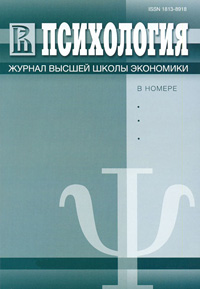Reinforcement and Weakening of Stroop Effect in Probabilistic Learning
Keywords:
distractor effect, interference, redundancy, entropy, Stroop effect, probabilistic learning, hierarchic hypothesis
Abstract
The phenomenology of perceptive attention in stimulus-distractor derivation condition is analyzed. Two oppositely directed effects — that of interference and of redundancy — are marked out. Formal prediction of the effect based on mathematic theory of connection is proposed. Hierarchic hypothesis of interaction of different distractor effects is looked at and is substantiated by experimental study of probabilistic learning with varying frequency of conflicting and congruent trials in Stroop test. It is assumed that word-colour combinations and probabilities appeal to different levels of distractor effects. It was found that low probability of conflicting trials leads to significant reinforcement of Stroop effect and practical impossibility to train; high probability leads to its practical disappearance.Downloads
Download data is not yet available.
Published
2011-01-13
How to Cite
УточкинИ. С. (2011). Reinforcement and Weakening of Stroop Effect in Probabilistic Learning. Psychology. Journal of the Higher School of Economics, 7(3), 139-149. https://doi.org/10.17323/1813-8918-2010-3-139-149
Issue
Section
Work in Progress





